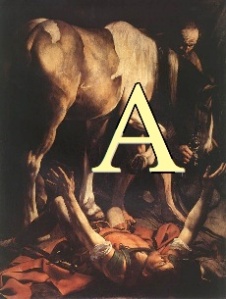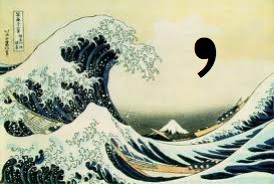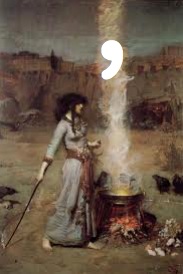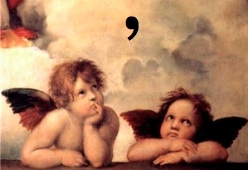Don’t treat your Shift key like it’s radioactive, but don’t scatter capital letters willy-nilly, either. The following rules will help you know when—and when not—to capitalize.
Obviously, a sentence should start with a capital letter; unless it’s enfolded in the arms of a bigger sentence, that is:
- Lacking a harpoon (there were none in the car), we had to make do with a knitting needle duct-taped to a hockey stick.
Even enclosed in parentheses, a sentence on its own needs a capital letter:
- Giant squids are slippery. (That’s why we needed the harpoon.)
The same is true of a sentence in quotation marks, even if it’s snuggled inside another sentence:
- A passing driver pulled over and said, “Call me Ishmael.”
But you don’t need a capital letter for a snuggled sentence that doesn’t take quotes:
- The question was, did it eat terriers?
Capitalization After Colons
A colon should be followed by a capital letter…sometimes. Capitalize when the colon introduces more than one sentence:
- His dilemma was unbearable: If he left the car, he’d be mauled by bears. If he stayed inside, all the ice cream would soon be gone.
But use lower case for everything else (with the exception of quoted sentences):
- Only one thing could calm his fury: tiddlywinks.
- Her temper was legendary: she’d once slapped a stock boy for wearing odd socks.
- His next words made her fear for her life: “We’re out of peanut butter.”
Another, simpler, rule is to capitalize after a colon whenever it introduces a complete sentence:
- Her temper was legendary: She’d once slapped a stock boy for wearing odd socks.
- Only one thing could calm his fury: tiddlywinks.
Both rules are valid. Pick one and stick to it.
Capitalizing Lists
Capitalize the first words of vertical lists that are itemized with numbers, letters, bullets, etc.:
To hunt a Snark you will need
- Thimbles
- Forks
- Railway shares
- Soap
Non-itemized lists can be left in lower case.
My creative process comprises four activities:
sleeping
thinking
lolling
procrastinating
Computer Terms
Capital letters are often used for computer keys, menu options, and commands:
- Hit the Return key.
- Choose Print from the File menu.
- Click on the Save button.
The Name Game
Capitalize the names of people, places, groups and organizations, titles of rank, religions and their practitioners, days and months, historical periods, and brand names. Parts of this rule are flexible, and parts are not; a dictionary can be very helpful here. As always, be consistent.
Names of People
In addition to people’s names, terms used as names must also be capitalized:
- I enjoyed my date with the Headless Horseman, but his kisses were pumpkiny.
This includes personifications, which are abstract ideas (e.g., nature, death, fortune) behaving like people:
- When Death comes to fetch me, I’ll be hiding under the bed.
Some words may or may not be capitalized, depending on the context. If you can substitute Joe, then you need a capital letter:
- She told us Pa was in the shed wrestling the pigs.
- My pa is a champion pig-wrestler.
- Our mom dabbles in the occult.
- I’m getting Mom a crystal ball for her birthday.
- Of course, Aunt Millie wanted a cut of the action.
- She’s our greediest aunt.
- Her engines can’t take much more of this, Captain!
- The captain pushed the Enterprise as fast as its special effects would allow.
Names of Places
Capitalize the names of places, such as Timbuktu, the Deep South, and the Fertile Crescent. Directions are only capitalized when used in the name of a specific region:
- Ever since I saw Doctor Zhivago, I’ve wanted to live in the North.
- We travelled north until the yetis complained.
- I love the boneless attitude on the West Coast.
- He lives with two ferrets in a trailer on Mexico’s west coast.
Words like street, bridge, square, avenue, etc., are capitalized when they follow a name:
- The mime silently threw himself off Burrard Bridge.
- Many a puppeteer has made a fortune in New York City.
- The puppeting arts are well respected in the city of New York.
Titles of Rank
Capitalize a title if it comes before a name, but not if it comes after. If you can replace the title with Mr. or Ms., then it should be capitalized; otherwise, leave it in lower case:
- Send the plutonium to Director of Operations Sue Urquart.
- Sue Urquart is the director of operations for Terrorism Inc.
- I was named after President Nixon.
- The cleaning staff were fed up with the president’s slovenly habits.
- The army was led by Queen Zenobia.
- Zenobia was the queen of Palmyra.
However, the UK and Canada both write the Queen when referring to the current monarch. The US is more democratically lower-case.
Historical Periods
Capitalize historical periods with distinctive characteristics, such as the Dark Ages, the Renaissance, and the Roaring Twenties:
- During the Depression she made buttons with her teeth.
- Economists greeted the recent depression with smug pessimism.
- She dived head-first into the hedonism and drug abuse of the Sixties.
- He inherited a fortune in the fifties and had spent it all by the end of the sixties.
Brand Names
Brand names, or trade names, are capitalized until they become so common that the capital letters wear off with use. For example, Kleenex is capitalized but jeep is not. To know whether or not to capitalize a trade name, check a dictionary.
Verbs derived from trade names are not capitalized. If you use a Xerox machine, you are xeroxing.
Words Derived From Names
Someone from Quebec is a Quebecer; someone who follows Marx is a Marxist. However, a member of the Nazi Party believes in nazism, and someone reminiscent of Don Quixote is quixotic. There is no logic here; consult a dictionary.
Next week: Capitalizing titles of books, movies, Web sites, and more




